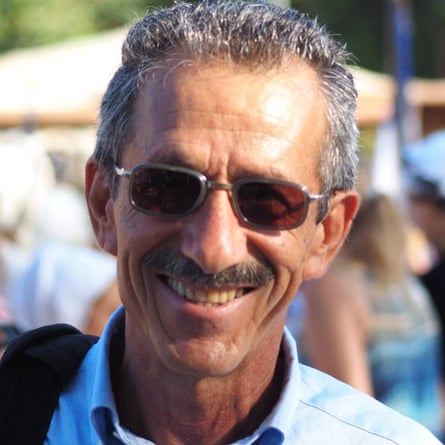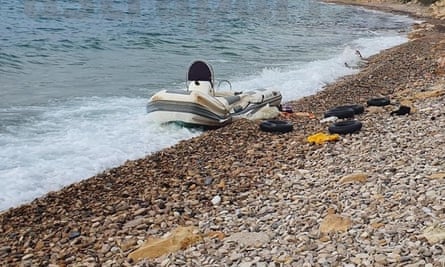When Ioannis Stevis moved back to his native island of Chios after a long career in journalism he could not have imagined that his retirement project would eventually put him at odds with his own government.
But the local online news service he created, Astraparis, ended up bearing witness to one of the most significant stories in recent European history: the ongoing refugee crisis.
In the past few months his reporting has turned to the boats carrying asylum seekers that have seemingly started vanishing after arriving on Greek shores.
It was the 65-year-old’s coverage of one of these disappearances that sparked controversy. The story was met with official denials and an apparently orchestrated effort to remove his news posts from Facebook, he says.
On 4 May, Stevis reported on the apparent arrival of a group of 14 asylum seekers from the Turkish mainland, about 3.5 miles across the Strait of Chios, on 30 April. There was a picture of their boat and testimony from locals who claimed to have seen the group after they left their landing beach.
Stevis, who used to edit the financial newspaper Kerdos in Athens, called the local police, coastguard and hospital; he contacted the European border agency Frontex, the UN refugee agency and the authorities at the main refugee camp on Chios. All denied any knowledge of an arrival on 30 April.
The official line, Stevis told the Guardian, was that the boat had washed up empty on the island’s shores, “something which contradicted all the testimonies I had gathered from respectable witnesses”.
Astraparis was not the only local outlet to notice the arrivals. Chios Press reported the story but later deleted it. Comments on a Facebook group discussing the refugee sightings were also removed.

Stevis’ reporting has not made him popular. “I am trying to say things as they are, although it is difficult to do so in a small place where everyone knows each other by their first name. I have lost friends and I have made many enemies.”
When Stevis returned to the island he grew up on in 2014, Chios was starting to be known for more than its mandarins and ship-owners. It was one of the handful of Greek islands that found itself on one of the busiest routes for asylum seekers trying to reach Europe from Turkey. Chios, along with four other Aegean islands, was selected to host refugees, and news on the island was beginning to be dominated by the crisis.
As the Aegean refugee camps swelled well beyond their original capacity, local people became increasingly frustrated at being used as a buffer zone. Anger has been directed towards the central government in Athens as well as the refugees and those seen to support them.
Stevis, who previously reported on finance and the environment, says the intense hostility he has faced since turning his hand to local news in Chios is something he has never experienced before. In 2016, a protester physically assaulted him while he was covering a far-right rally on the island. “These are unprecedented things also for me,” he says, adding that he has also dealt with a large amount of opposition online and local resentment over his stories.
When Kyriakos Mitsotakis led his New Democracy conservatives to power last July, he promised to manage the migration flow to the islands and strengthen the borders. That commitment was tested earlier this year by a sharp increase in asylum seekers crossing the Aegean after Turkish president Recep Tayyip Erdoğan vowed to “open the gates” to Europe, effectively ending its deal with the EU to host millions of refugees in return for aid money.
Since early March, there has been a tense standoff along the land and sea borders between the two countries. And there have been mounting reports of illegal pushback of refugees and migrants from Greece to Turkey.
“In the Aegean we could see this undeclared war,” says Stevis. “We could see that the boats couldn’t reach Greece because they wouldn’t allow them to. Pushbacks were an everyday reality. What we hadn’t seen before was the boats arrive and the people disappear.”

On 30 April, that appears to have been what happened. A witness, who spoke on condition of anonymity, says they saw and took photos of the boat on the beach in Chios and were told by a Greek coastguard officer that the refugees had got off the boat and were being kept inside a nearby house. The witness was told by the officer to go home, and warned they were being watched.
The fate of the refugees is unknown, although the Turkish coastguard reported picking up a group of 14 people from an uninhabited rock islet in Turkish waters on 1 May.
Two independent investigative journalism organisations, Bellingcat and Lighthouse Reports, recently published a detailed account of a similar maritime pushback on 28 April from the nearby island of Samos. In that incident, new arrivals were reportedly detained before being put into a life-raft with no engine and towed back out to sea towards Turkish waters by the Greek coastguard.
Responding to questions in parliament on the pushback on Chios, the migration minister and Chios MP for New Democracy, Notis Mitarakis, said the reports “do not exist as facts”. In a media interview Mitarakis also claimed that photos of the boat on the shore may have been from February or March.
Two weeks after its initial story, Astraparis published a second story in response to the minister’s denials with the headline “Are those [people] aliens we see in Monolia beach Mr Mitarakis?” A photo accompanying the story showed refugees walking on Monolia. Stevis released the metadata from the image, which made clear it was taken on 30 April.
A few days after the second article, Stevis’ Facebook posts disappeared overnight in what seemed like a targeted online attack.
While Stevis has no political affiliation, a local leftwing political party, Chiaki Sympoliteia, issued a statement condemning the apparent online attack on him. Ermioni Frezouli, a party member and former city councillor on Chios, said that outlets such as Astraparis were vital. “Journalists like Ioannis Stevis and other outlets such as the Press Project [an independent Greek media outlet] are really needed,” she said.
But Frezouli says that speaking out on these issues was difficult on a small island. “Even if people are pro-refugees they wouldn’t dare to go out publicly and go against the minister of migration. He was elected on Chios, he is a Chios representative in parliament,” she says. “If someone has a job in a shop or a job that depends on society, they are also afraid because of this. All the islands are small societies and so there is this social censoring.”

The migration ministry declined a Guardian request for comment. The port authorities on Chios denied there were any arrivals on 30 April.
The International Organization for Migration and the UNHCR have both released statements urging Greece to investigate the pushbacks. “Such allegations have increased since March and reports indicate that several groups of people may have been summarily returned after reaching Greek territory,” a spokesperson from UNHCR said.
However, last week the Greek shipping minister, Ioannis Plakiotakis, denied the allegations. “The Greek coastguard always operates in accordance with the principles of international law,” he said in a press conference.
Stevis says that even though the removal of posts on the Astraparis Facebook page worried him, he did not regret pursuing the story. “I could have hid it like the other [news outlets] did; they posted it and deleted it. I could have said that nothing has happened and let it pass but these are important issues,” he says.
“[Pushbacks are] not something that just violates the law, it’s immoral in every way, no matter how you look at it: at a personal, ethical, religious, political level. They endanger human lives and they endanger the reputation of the country.”
Reporting for this article was supported by the Borders Newsroom at Lighthouse Reports
